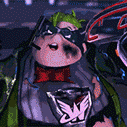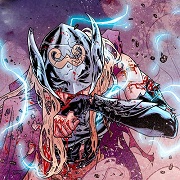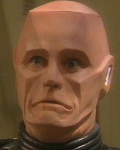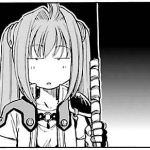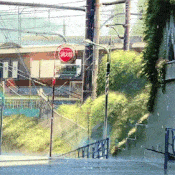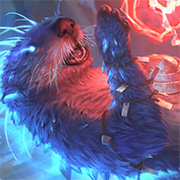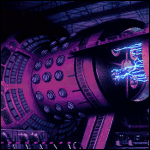|
Thwomp posted:Somewhat. It's more today's society still dealing with having been given advanced technology. Today's society? Not even close; the Humans depicted in Mass Effect are a single united planet under a single united governing force that appears to be primarily western dominated. They are about as far from today's societies as you can get while still being recognisably Human. e: Unless by 'today's society' you mean "American Society" in which case you're closer. e2: Also not to say all Humans are part of the Systems Alliance, but the majority certainly seem to be and definitely all of Earth is, that plus the fact that more than a century of normal development seperates us from the ME Humans before they even discover Element Zero so they shouldn't look much like present day societies. Neruz fucked around with this message at 03:32 on Aug 17, 2014 |
|
|
|

|
| # ? Apr 25, 2024 06:07 |
|
Neruz posted:Today's society? Not even close; the Humans depicted in Mass Effect are a single united planet under a single united governing force that appears to be primarily western dominated. They are about as far from today's societies as you can get while still being recognisably Human. I think the biggest difference is that things are still changing in the ME universe, while the SW universe has been the same for roughly 5000 years. In ME, traveling across the universe is still an exciting prospect for most people, involves using experimental technology, and seems to cost a not insignificant amount. There's still mystery and intrigue in the universe. In SW interstellar travel costs 50 credits and is the most boring, routine thing in the world for the people in that universe since even the most run down piece of poo poo space craft essentially can't fail unless someone tries to blow it up. The only mystery here is when Vader's next Secret Apprentice is going to pop their head out. I think we're at 13? Flytrap fucked around with this message at 03:43 on Aug 17, 2014 |
|
|
|
Mazerunner posted:Did you... did you even read geostomp's post? He was asking for the opposite of that, to not have a galactic destroying enemy and focus on smaller scale stories. Or am I misinterpreting your post? You're misinterpreting my post. I was saying how stupid the post RotJ Star Wars adventures were because they had to constantly one-up what happened before them, which made each sacrifice made for nothing. If Mass Effect has something far worse than the Reapers arrive then what was the point of fighting the Reapers? Besides the fact that it would be really loving hard to create a menace that would have to avoid conflict with the Reapers for gently caress knows how long.
|
|
|
|
Hitlers Gay Secret posted:You're misinterpreting my post. I was saying how stupid the post RotJ Star Wars adventures were because they had to constantly one-up what happened before them, which made each sacrifice made for nothing. If Mass Effect has something far worse than the Reapers arrive then what was the point of fighting the Reapers? Besides the fact that it would be really loving hard to create a menace that would have to avoid conflict with the Reapers for gently caress knows how long. Ah, sorry. It looked like you were arguing with Geostomp even though he agreed with you but you were actually just agreeing with him, ok.
|
|
|
|
Hitlers Gay Secret posted:You're misinterpreting my post. I was saying how stupid the post RotJ Star Wars adventures were because they had to constantly one-up what happened before them, which made each sacrifice made for nothing. If Mass Effect has something far worse than the Reapers arrive then what was the point of fighting the Reapers? Besides the fact that it would be really loving hard to create a menace that would have to avoid conflict with the Reapers for gently caress knows how long. To follow on your point, I hope the Mass Effect writers realize you don't need to increase the objective scale of a threat to keep things interesting, you just need to make sure the relative threat is kept to a high enough bar. In other words, the next Mass Effect doesn't need to involve something stronger than the Reapers to be interesting, it just needs the threat to be personal and dangerous enough to the main characters to make it interesting. If the next game, for argument's sake, is about a turian trying to take it to the street gangs of Omega, then it will still be interesting because the relative threat of the collective street gangs of Omega in comparison to one turian (or a small group of turians) is enough. You still feel like you're fighting an uphill, maybe impossible, battle against a relentless foe even though the scale of the conflict is significantly reduced. I really don't want to see the Mass Effect equivalent of the Sun Crusher.
|
|
|
|
Covok posted:
Is that an actual thing in Star Wars?
|
|
|
|
SgtSteel91 posted:Is that an actual thing in Star Wars? Technically, but all expanded universe content was recently expunged from the "canon" of star wars, if you follow that stuff. So, in other words, no one is ever going to bring it up again.
|
|
|
|
SgtSteel91 posted:Is that an actual thing in Star Wars? That was the thing I was actually alluding to.
|
|
|
|
BioMe posted:The father thing in ME2 was more of a motif than anything. I mean yeah, fathers show up a lot, but what did all those subplots as whole actually have to say about fathers? They certainly weren't long enough to count as some general exploration of fatherhood, especially when the one thing they had in common beyond that was that none of the fathers really acted like fathers. ME2 was actually my favorite ME game and I felt it was the strongest cohesively themed of the three. The theme is not just fathers, but whether or not fathers have to right to shape the future of their children. and whether children should remain loyal to their fathers. Each story examines this from a different angle, sometimes placing to in the position of the father, sometimes putting you in the position of the child. The entire story itself is Harbinger Dad telling Humanity to grow up and be a Reaper and Humanity going 'gently caress you dad.' Shepard is reborn as the Illusive Man's son through death and rebirth and he's the one more or less calling the shots, and the real moral compass of the game isn't necessarily renegade or paragon, but how often you say 'gently caress you dad' to him. More often than not you're in the position of the father in the loyalty missions, which sort of puts the theme on its head. Legion may be brothers with his fellow Geth, but Shepard is definitely in the role of dear old controlling dad in that mission, teaching his brothers to get in line with either a firm talking to and a good old lecture about the bible (brainwashing) or corporeal punishment (explosion). I don't think ME2 gives a very decisive answer as to whether children have an obligation to listen to or be loyal to dad, as sometimes dad is clearly in the right (Thane, Samara) or the kid wants to be loyal anyways (Tali), but it is very clear that Dad should step the gently caress off and let kids make their own mistakes instead of 'assuming direct control' of the situation. Basically it's an anti-helicopter parent tract. Edit: Actually thinking about it for a moment, it is pretty clear. Dad should step in and help out when the kids in crisis, such as in Thanes scenario, but the kid doesn't owe him anything, and the dad shouldn't control them or hang that over the kids head and the dad needs to be forgiving when the kid fucks up, 'cause kids gently caress up. Also: If you're dad's a The Ghost of Ember fucked around with this message at 09:20 on Aug 17, 2014 |
|
|
|
Mass Effect 2 - Secretly teaching its fanbase how to be a good parent 
|
|
|
|
I really hope you show off the Blasto 6 clips in this game, Lt. Danger.
|
|
|
|
The Ghost of Ember posted:ME2 was actually my favorite ME game and I felt it was the strongest cohesively themed of the three. The theme is not just fathers, but whether or not fathers have to right to shape the future of their children. and whether children should remain loyal to their fathers. Each story examines this from a different angle, sometimes placing to in the position of the father, sometimes putting you in the position of the child. The entire story itself is Harbinger Dad telling Humanity to grow up and be a Reaper and Humanity going 'gently caress you dad.' Shepard is reborn as the Illusive Man's son through death and rebirth and he's the one more or less calling the shots, and the real moral compass of the game isn't necessarily renegade or paragon, but how often you say 'gently caress you dad' to him. So essentially the story theme of ME2 is "No dad, YOU shut the gently caress up! In all my plathroughs of ME2, I've never once noticed the father/parent motif going on in the story.  Thanks for laying it out in a easy-to-get way. Thanks for laying it out in a easy-to-get way.
|
|
|
|
 Part 9: Criticism Further Reading Baraka: https://www.youtube.com/watch?v=H9jGIKdvoW8 Talisweat.jpg: http://www.somethingawful.com/weekend-web/bioware-social-forums/1/ Andorian reproduction: http://memory-beta.wikia.com/wiki/Andorian_genders New Yorker article on 'likeability': http://www.newyorker.com/online/blogs/books/2013/05/would-you-want-to-be-friends-with-humbert-humbert-a-forum-on-likeability.html SuperMechagodzilla on Aliens: Colonial Marines: http://pastebin.com/Ej4ASNdk MEHEM: http://forum.bioware.com/topic/419665-mehem-the-mass-effect-3-happy-ending-mod-no-more-star-kid-no-more-deaths-and-a-reunion/ Thane Mod: http://www.nexusmods.com/masseffect3/mods/180/ Now entering the Benny Russell Own Zone.
|
|
|
|
That Thane mod is funny because even though I hate Kai Lang, I liked the end to Thane's story. I had turned down Thane's final advance in ME2 and I had liked how Thane had acknowledged that. I wont go into more detail because you slapped that spoiler rule on the thread but I find that mod to be some way to feed their obsession with a fictional character.
|
|
|
|
Did you really need to go on that rant for so drat long? I agree with you entirely but it was bordering on insufferable and I didn't feel as if you managed to really justify equating a video game to a text. I get annoyed with people who go crazy when someone dies on Game of Thrones, because I too see characters in a story in terms of their function within the story. But this is a video game. The writers didn't write Grunt's death, you chose it. It isn't hard to imagine that players infer the intended 'true' text to be a perfect state where every original cast member is alive and that they prefer to see how the story and themes play out in that state over a state where those established characters are replaced by a character with less writing to it(partly fuelled by a desire to 100% the game). That 'true' text is an illusion of course, I get that, but you were pretty unflinching and unforgiving in your rant there. EDIT: Sorry, I didn't mean for it to sound so rough anyway. I have no interest in Mass Effect and I'm mostly watching for your analysis which I think is great, even in this video. But it was just a bit too condescending really. NeilPerry fucked around with this message at 23:07 on Aug 17, 2014 |
|
|
|
While I agree with you about the nature of stories, Lt. Danger, I must wonder, doesn't the very nature of the systems of the game encourage this preoccupation with the tools of storytelling? When you're expected to grow the relationship with Shepard (who is less a player avatar than say, the Fallout Player Character, but nonetheless is a player avatar) and NPC Party Member #1 into a friendship in order to get better results and upgrades and interesting new choices that are otherwise locked out if you don't make friends, isn't the game explicitly encouraging you to see the characters as your friends? Perhaps this is a conflict between game design trying to carrot you into discovering the story, but the fact that romances and titillation are explicitly used as rewards for being nice and friendly towards characters makes me doubt this. Nonetheless, when losing a character is losing a possibility, an upgrade, a potential choice, a point off their score, it's easy to see why people get possessive and aggressive. Death is game over. Death of party NPC is a loss of a resource that gets you closer to a game over. Not many people that I'm aware of rage over Darth Vader's end. Hardly anyone tries to bring back Hudson from his game over. Elijah Bailey is allowed to rot in the ground while his cybernetic partner continues on, and there's no great demand to bring him back. Because their text is immutable and the person experiencing the story has no reason to try to change what happened. It's as much nonsense as going back and trying to rewrite history, it's already happened. You can't change anything. Yet do the same thing to Garrus as you do to Hamlet and suddenly everyone gets defensive. I'm reminded of my old choose-your own adventure books as a kid, where I'd shove my finger in-between the pages as an impromptu bookmark at every choice, when one went badly for my 'avatar' within the story and I got a 'bad ending,' I'd just flip back to that bookmarked choice and try again until I got the 'best' option. While each ending was technically valid, more than a few made okay morality plays, it's ultimately natural for me to want 'my' story to show me in the best possible light and give me the best possible results, same as most amateur writers create thinly veiled power fantasies for themselves. The Ghost of Ember fucked around with this message at 23:37 on Aug 17, 2014 |
|
|
|
This was the first video I really watched and I don't think I'm going to watch any more. I can't articulate why but I felt offended(?) with a lot of what you said and I strongly disagree.
|
|
|
|
I'm still not quite clear on whether or not this is just your opinion, could you please clarify that in the next video.
|
|
|
|
The deaths of major characters in Mass Effect is one of those weird things that's stuck in limbo somewhere between being arbitrarily important and just being arbitrary. We've already seen how Mordin and Wrex being dead causes them to be replaced with Not-Mordin and Not-Wrex, characters who serve entirely the same purposes, send you on entirely the same missions and between them offer exactly one meaningful change to the range of long-term story consequences available to the player. More positively, Not-Mordin and Not-Wrex at least have distinct and sometimes-not-completely-interchangeable voice-acting complete with some of their own unique Designated Character Moments. (After we're done with the Tuchanka arc I'll complain a bit more about the effects Not-Mordin and Not-Wrex are able to exert on the resolution.) Other characters fare even worse. For one, other than their gameplay abilities, Ashley and Kaidan are completely interchangeable once Virmire is done with. For another, the deaths of most of the cast of ME2 - either during ME2 or in ME3 as a result of choices made in ME2 - are almost completely inconsequential. In the fashion to which we are accustomed, if Grunt dies in ME2 he is replaced with Not-Grunt. Then you do the Rachni mission, during which Grunt (or Not-Grunt) might die (I think Not-Grunt will always die though). If Grunt does indeed not die, the only thing that changes (aside from dialogue during designated "check dead characters" sections) is that he is added to your War Assets. Now I think about it, the Rachni Queen is handled in pretty much the same way; not a whole lot really changes based on the decision that isn't rendered in War Assets somehow. Later we will see that this is true of almost every character who can potentially die in ME2. Given how little Grunt's death changes, pretty much the sole difference between one branch and the other is that a character has or has not died and you will or will not be periodically reminded of this. With that in mind, is it really any wonder that people consider these character deaths failure on the part of the player? What other criterion is there by which to judge these decisions? It's not as though either option is really any more or less interesting than the other (Not-Mordin and Not-Wrex excluded); the only two way left to frame it are either Doing ME2 Right vs Not Doing That or Keeping ~My Favourite Character~ Alive vs Not Doing That. It's cool, I guess, that BioWare did all this extra writing and VA for all these options, but for all their effort at ~consequences~ they forgot to make any of the choices worth a drat. So, good for you, you killed Grunt and changed nothing. But that's just my opinion. Just my opinion. It's just my opinion - my opinion, okay? My opinion. Just my opinion. My. Opinion. Okay?
|
|
|
|
I have a response to Lt. Danger's point, which in no way invalidates or refutes what he was saying because I agree with it. While reading into and understanding the themes of the story is important, there's no reason you can't enjoy a work on multiple levels. Your argument in the last video seemed to say that only themes matter and are worthy of attention or consideration, period. That's how it came across. Maybe that is what you're saying, in which case I disagree with that part.
|
|
|
|
People have been caring about fictional characters for a long-rear end time. It's probably dumb to care about fictional characters, certainly to care about them more than real life people, but then again you could say the same thing about communicating an idea via a pretend story about made-up people that takes place between high-octane pretend gun battles instead of an essay or something.
|
|
|
|
2house2fly posted:People have been caring about fictional characters for a long-rear end time. It's probably dumb to care about fictional characters, certainly to care about them more than real life people, but then again you could say the same thing about communicating an idea via a pretend story about made-up people that takes place between high-octane pretend gun battles instead of an essay or something. Well, I can imagine that one form of communication, while less direct, will reach more people even those who may not be looking into the idea while the other form of communication, while more direct, will likely only reach people actively seeking information on the topic.
|
|
|
|
Honestly, I find the idea that you should only care about a story to the depth that its narrative leads to be a bit narrow-minded and, in my humble opinion, simply wrong. I have a long history of improv acting and one of the basic tenants of improv scenes is that a "scene" must have conflict and that conflict can either be narrative driven, such as two men in a boat during a storm, or CHARACTER driven, which would be two men in a boat fighting over which actor portrayed Batman the best. To say that a story only has as much content as can be derived from the narrative or that the characterization of the people involved are only tools in which to further some unseen agenda takes away the ability to enjoy a story, not for it's overarching narrative, but because of the CHARACTERS being portrayed. You summarily dismiss one of the DLC packs brought out for this game because it has less plot progression and more character development and that makes it "bad". You statements indicate that only increases to the overall plot have any actual value, whereas extra data used as a context lens through which the already existing plot is seen as useless and wasteful. I honestly could not disagree with that sentiment any more vehemently. As long as you are approaching a work that was primarily intended to focus on the CHARACTERS being portrayed, which you have said has been a focus of the Mass Effect games since the beginning, trying to understand the characters motivations and modus operandi only with context clues given through the narrative becomes an integral part of understanding the work. To wit, if you invest substantial time and effort trying to understand a character the way that the creators intended, only to have that character be taken away from you because of a choice, of course you are going to feel an emotional reaction, even if they are not your "friends". They mattered to you because you enjoyed them. The same way that a pet fish can never really be your "friend" and, yet, you would probably still cry as you flushed poor "Mr. Bubbles" down the toilet. In summary, to say that the only way anyone is allowed to enjoy a story is only through the story arc of the narrative is a sure sign that your view of literature is extremely dry and you have a tendency to miss the TREES because you are too focused on the FOREST. THIS IS JUST MY OPINION.
|
|
|
|
The story, especially in an interactive medium like videogames, does not exist in a vacuum. I think it's more than a little problematic to try to look at it that way. In order to have the story, you need the themes, characters, setting, mechanics, etc. all bundled into one package. And because it's an interactive medium, people will naturally become attached to characters. In fact, in this case, they're designed with that in mind. They are designed for the player to have some form of attachment to them, to make the player care about them, personally. To care if they chose Liara or Sheppy the volus as Love Interest. To care if they live or they die. Because if they die, it is more often than not the player's fault. It is a failure to the player, a "less than optimal" run if you will. Actually, I'll use that point as a mechanical comparison. In most of the Metroid series, there are a few ways of going about completion, a good chunk of the time people will try for a 100% run or some form of speedrun. Complete the game as fast as possible or as completely as possible. The player is rewarded in some way for this extra effort put in, be it "oh hey SAMUS WAS A GIRL ALL ALONG, see you next mission!" or "here is Samus without armor good job, see you next mission!" or in the case of the Prime series especially "Metroid Prime/Dark Samus/somejackass is sill out there and they want blood, see you next mission!" 100% runs have the added benefit of making the player basically unstoppable, rewarding the extra effort the player puts in by making the player stronger. It's the same deal in Mass Effect. Sure Grunt has more dialogue than an Energy Tank and Maleon's cure is functionally more important to the story than a Power Bomb expansion, but you need both to "100%" the respective games. You keep Grunt alive, good job, Grunt lives. You keep Wrex alive, good job, he isn't replaced with his rear end in a top hat brother. You keep Wrex alive, saved Maleon's cure data, and weren't going to backstab the krogan? Congradulations, you have an optimal condition and the full support of the krogan people against the Reapers. Here are extra Funtime War Bux, er, "Galactic Readiness points" to add to your total. The game and story both reward caring for the characters of it and putting in the extra effort to keep them alive. Compounding this is how easy such things are for the player. ME2's "failure" ending is actually more difficult to achieve than its "perfect" ending. The intention is to have the player win in some manner, which makes perfect sense given how the often throughout ME2's gameplay you were reminded that there will be a third game. Yes, your choices matter. But because you can go back and correct mistakes, what it functionally turns into is "You made a choice and you chose wrong. You monster. You better go fix it or FULL LIFE CONSEQUENCES, John Shepord." I apologize for bringing this next subject up but since you had to mention MEHEM, I couldn't let it exist on its own, there's a comment someone made a while back about the ending that ties into what I'm talking about. Spoilered this for that reason. Someone mentioned a few posts ago that if Shepard could talk down the Godchild Catalyst being and convince it that it's wrong, people would only go for that option because it would be the best result. It would be the "perfect victory." And I agree. Because that's what has been present throughout ALL of Mass Effect as a series, a possible "perfect run" of the games where you stop the Reapers thanks to everything you, Shepard, the player, did. Speaking in those terms, the MEHEM is that same kind of "perfect victory" for those who felt that the ones presented in the vanilla game (and especially without the Extended Cut) to them were not, with additional pieces added to it like Harbinger going back to his ME2-style taunting rather than the Angry Reaper Honks. Yes people will be drawn to characters living, but they'll also be drawn to having, in no uncertain terms, "won" in a manner they feel more satisfying, more "perfect," than what the vanilla game presented. "Themes" be damned. Of course, in the true canon ending is where the Catalyst turns Blasto into the Legendary Super Specter and defeats all the Reapers, anything else is a pointless endeavor.
|
|
|
|
Insert joke about opinions here. Lt. Danger I actually quite enjoyed your analysis, as mixed about your opinion as I am. I do have one counter I'd like to bring up: you say that characters are tools and symbols with which to convey a story or message, and therefore focusing on the characters at the expense of the greater message is doing the author a disservice. The problem though, is that Bioware has billed themselves around character focused narrative. Every time they put out a new game they focus on this character or that character, and how you can romance them, or befriend them, or learn their secrets, etc. One of the big selling points Bioware pointed to for ME2 was that you could romance Tali and Garrus. They explicitly went out of their way to shoehorn every ME1 and ME2 character in for their cameo in ME3. In promotions and interviews and game design Bioware constantly again and again harp on their characters. This builds an expectation for the player, and colors their perceptions of the story. When Bioware says we should care about the game because x character is awesome or y character is can be romanced, that's what players end up focusing on. And with so much time and focus going into how the player can choose to interact with this buffet of characters, it takes focus away from the narrative and instead places it on the social dynamics of the Normandy crew and Shepard. Can you really complain about the player becoming fixated on characters when the game itself is built and billed around the numerous ways you can interact with said characters? Sydin fucked around with this message at 02:19 on Aug 18, 2014 |
|
|
|
So I think that was interesting as a whole, and I agree that viewing media as escapism instead of viewing it critically in the context of the real world is a bit childish sometimes, I think it's also kind of understandable. More importantly, never repeat a phrase that long, holy poo poo that was so annoying and such a shift from the interesting and analytic commentary, I almost gave up watching.
|
|
|
|
Is it really so wrong to be interested in the characters of a story? They're the means by which a story progresses and, to me, placing them as elements of secondary importance seems like a mistake, especially considering that the story they're advancing places so much importance on their motivations, personality and relationships. Yes, there are different levels of importance that characters take in a story but, in essence, the story itself is always driven by some conflict or desire of the characters: it builds events around characters and places them front-and-center, compelling the reader to care, to identify, to want to know what's going to happen to them. If you focus solely on the overarching events, to me, it'd feel more like I'm getting a history report than a story. When you have an active interest for characters in a character-driven plot like Mass Effect, you see these characters as more than just supports for the overall plot - it becomes less about "How can the Reapers be stopped?" and more "How will THEY stop the Reapers?" - and, really, (going by StrifeHira's analogy here) a fiction writer is allowed, if he so desires, to focus on the trees than on the forest itself. Mind, there IS something as too much attachment as you pointed out in those quotes and links and escapism is something to be avoided but I don't see the harm in a reader appreciating and liking characters that they've followed for hours (dozens, in this case) - that's the whole point. These characters are not FRIENDS but, at the end of the story, they're certainly more than mere lines of dialogue to the engaged reader. All I said above is my own perception, bouncing off your argument for the sake of stating my own views on the subject, but I will have to actively object on the point where you said you were RIGHT. This all comes down to taste: some people prefer to focus on the trees and others on the forest and, really, that's fine. In the end, there is no such thing as right or wrong when you're stating your opinion on matter like this. It is only your perception of it and, regardless of whether you agree with someone else or not, that's all there is to it. Brunom1 fucked around with this message at 04:28 on Aug 18, 2014 |
|
|
|
Fun fact; while intellectually we recognise that fictional characters do not actually exist, subconsciously this isn't the case at all. While Grunt does indeed not exist, a part of you kind of thinks he does in a way. This is why people tend to react so violently to things that 'break immersion' because on an emotional level when immersion is broken you are recognising that things you are looking at are fictional, effectively to a part of you an entire universe and all the characters within have just died. Now of course this is all extremely low level, we're talking basic instincts\lizard brain level here. But that's why people flip the gently caress out over things that break their immersion; that said the fact that at a basic level your subconscious can be so easily fooled into believing fiction is probably responsible for a lot about how people interpret and react to visual media like films and vidjeo games. (Yeah it applies to films as well, so long as you have an image that looks real enough and sounds that sound real enough your lizard brain believes its real unless presented with definitive evidence that it isnt.)
|
|
|
|
Probably the worst part about a Universe in which Grunt is dead is that you miss out on one of the best scenes in ME3: Citadel. In fact ME3: Citadel is a really good reason to keep everyone alive Yes, even Mordin (at least through ME2).
|
|
|
|
Like most people, I agree with a lot of what you said, and disagree with other parts. I'm on the same page when it comes to the attachment that people tend to develop with fictional entities, and that the personal investment that comes with that often does so at the cost of story - Character A is great, I sure do love character A, therefore THEY CAN NEVER DIE, EVER, regardless of whether their death or survival hinders or advances the story. The area where I disagree with you is that, as a videogame, the choice is entirely up to the players as to who survives or dies. (Metagaming aside). The Writers did not really incorporate any character's death to be part of a satisfying plot arc, it was almost always a binary succeed/fail option unlinked to causality. Whether or not a character dies, the void would be quickly filled by a plot surrogate. If there is meaning to be found in a character's death at a certain time, as in your case with Mordin, it's the kind of insight that comes after a playthrough, and not naturally as a decision or series of decisions made through the course of the game. In that sense, none of the characters' deaths serve the plot, or theme of the game particularly well. One thing that I think was handled poorly was, as has been often mentioned, the fact that a character's death or survival was almost entirely arbitrary. Whether or not I completed any given loyalty mission should have exactly zero effect on whether or not a character catches a bullet months later, or gets cooked in the vents. There's no logical sequence of events that could possibly link the two, and so, in order to achieve the most desirable endings, players are forced to meta-game, and manipulate mechanics that make no goddamned sense in the game world. (I suppose the exception to this could have been Wrex in ME1, but even that situation still felt a bit contrived and sudden) I think that that could have been much more interesting - if our crew were following individual plotlines that would eventually tie them to their doom, whether through self-destructive behaviour, revenge, circumstance, etc. What if a character WANTED to die, and was willing to in order to accomplish their goal? What if shepard prevented that, how would they respond? The best example for a decision like this was Tali's loyalty mission ME2 - where at the end you are forced to make a choice between leniency for Tali at the cost of expunging her father's records, or exile from the nomad fleet. The results in terms of the characters were very satisfying - I feel that I made the right choice, and in doing so pissed off Tali. The conflict there was great - a character acting in other's best interest, even when the other does not want that. The bullshit part of that was how her being pissed off at me apparently led to her getting cooked in the vents.
|
|
|
|
McKilligan posted:The bullshit part of that was how her being pissed off at me apparently led to her getting cooked in the vents. She just wasn't motivated enough and also I will never understand why anyone other than Legion is ever sent into the vents. Just think about it for a moment; we need to send a tech savvy person through coolant pipes (or whatever the gently caress the pipes were) which we know will be an extremely toxic environment. We can send a machine that is at precisely zero risk from said toxic environment, or literally anyone else.
|
|
|
|
Neruz posted:She just wasn't motivated enough and also I will never understand why anyone other than Legion is ever sent into the vents. Because sending legion to the vents means you don't get to fight alongside the killer robot Personally I hate killing people off because I'm a completionist prick that doesn't want to miss sidequests or fail/skip the required rolls to save them. Just about every person you can kill in mass effect requires either a failed persuasion or actively deciding to kill them. I think a lot of people view character deaths in mass effect a lot like fire emblem; I mean sure, you were never gonna use that guy anyway, but killing them means failing to bring them home and failing as a commander.
|
|
|
|
I think you're at risk of presenting a false dichotomy here. It starts to suggest that the only avenues available are autistic obsession with technical detail, or doing this. That actually becomes quite pretentious and not nearly as clever as it thinks it is, particularly when it's applied to things that clearly don't work in that way. Koyaanisqatsi isn't Super Mario Brothers (just ask Bob Hoskins) and treating it as if it is just has that desperate air of, "gently caress you dad, video games are just like Shakespeare or Van Gogh". The vast majority of fictional works ever created, though, work on the basis of having the viewer identify with and cheer on the characters involved. Video games go one step further and actually give the player some control over the character, which defines the medium in an entirely different way to having the person watching simply being a passive observer. To suggest that this is ultimately irrelevant to the the overall goal of the format is to almost entirely miss the point of video games, and leads me to wonder if it wouldn't be easier just to flog the Xbox and go read a Yukio Mishima novel instead. If I was reviewing Dredd, I wouldn't do so in the same way that I'd review Citizen Kane, and that doesn't make Dredd inherently a bad film or that it's particularly low-brow to enjoy the film for what it is. While there are certainly underlying concepts within that universe that could be explored (fascism, poverty), it's basically an action film where stuff gets blown up in slow motion and you want Dredd to kill the bad guys. It doesn't work if they all stop at the end and have a Sophie's World conversation where they all start to recognise themselves as fictional characters. It's not actually cleverer to do it that way, and I doubt that Orson Welles intended Citizen Kane to be approached in that manner, either. You're still supposed to care at the end, not just to use it as the intellectual equivalent of the soggy biscuit game.
|
|
|
|
Neruz posted:She just wasn't motivated enough and also I will never understand why anyone other than Legion is ever sent into the vents. Which, again, would have been loving great as a mechanic! But like you said, it isn't the obviously illogical choice of sending someone with a frail biology into a particularly dangerous toxic environment, it's whether or not you made an arbitrary decision weeks ago. Hell, I would have thought it kind of funny if because of COURSE she would die in there, dumbfuck, what did you expect? Like I said, I think ME2 would have been cooler if Shepard were more about intercepting damaged individuals before they succumb to cycles of violence and self-destruction (which it KIND of is, but poorly implemented on a gameplay level). Left on their own, their individual plots could find natural ends in violent oblivion, revenge, noble sacrifice, berzerker lust, but Shepard requires their talents for a greater purpose, so interrupts, delays, or denies them their destiny to suit his, and the galaxy's needs. They could be grateful, resentful, or indebted to Shepard as a result. Basically, I just want a character's death to have some loving causality, a plot arc, behind it. That is what the Mass Effect series has almost completely failed to do (with a few exceptions). Or, even to just be the result of a stupid decision by the player (as in the Tali vents suggestion). In that way, it might be far more satisfying from a narrative standpoint to enable to a character to enact bloody vengeance, even if it means their ultimate demise, rather than simply keeping the entire crew intact.
|
|
|
FoolyCharged posted:Because sending legion to the vents means you don't get to fight alongside the killer robot This is also one of the elements in play that I think is getting willfully ignored; the nature of video games associates primary characters dying with failure states. Especially in Mass Effect, where the middle entry's whole premise is you have to get ready for the deadly mission, how many casualties will there be?! The more buttons you find and push, the lower the number goes! To look at the negative reaction to a failure state and look down your nose and give a long-winded 'excuse me but you seem too attached to your pixel mans' lecture is to misdiagnose. I'm sure you could dredge up a million different embarassing 'tali is my waifu' posts from all sorts of dark corners of the internet, but "i dug through the internet and found a stupid thing" is an intellectually void thing to criticize, like when my cat brings me a dead lizard. Why did you do this, cat, why would I care what corpse you dredged up?
|
|
|
|
|
McKilligan posted:Which, again, would have been loving great as a mechanic! But like you said, it isn't the obviously illogical choice of sending someone with a frail biology into a particularly dangerous toxic environment, it's whether or not you made an arbitrary decision weeks ago. Oh yeah I know the actual in-game reasons that determine whether characters live or die in the final sequence are stupid but on the other hand there is no logical reason why Shepard wouldn't send Legion into the ducts; he is objectively the best choice from an in-character perspective. I think he even survives the vents regardless of whether you completed his loyalty mission or not though I'm not 100% sure about that. Heatwizard posted:This is also one of the elements in play that I think is getting willfully ignored; the nature of video games associates primary characters dying with failure states. Especially in Mass Effect, where the middle entry's whole premise is you have to get ready for the deadly mission, how many casualties will there be?! The more buttons you find and push, the lower the number goes! To look at the negative reaction to a failure state and look down your nose and give a long-winded 'excuse me but you seem too attached to your pixel mans' lecture is to misdiagnose. I'm sure you could dredge up a million different embarassing 'tali is my waifu' posts from all sorts of dark corners of the internet, but "i dug through the internet and found a stupid thing" is an intellectually void thing to criticize, like when my cat brings me a dead lizard. Why did you do this, cat, why would I care what corpse you dredged up? Most human beings can agree that people dying is a bad thing and best avoided unless absolutely neccessary, ergo if you have a story where characters can die people will generally consider the outcomes where the least number of 'good' characters die to be the 'best' Neruz fucked around with this message at 05:17 on Aug 18, 2014 |
|
|
|
Neruz posted:I think he even survives the vents regardless of whether you completed his loyalty mission or not though I'm not 100% sure about that. Nope, he explodes if you didn't do his loyalty mission. He also explodes if your fireteam leader isn't also loyal, which makes even less sense.
|
|
|
|
MarquiseMindfang posted:Nope, he explodes if you didn't do his loyalty mission. He also explodes if your fireteam leader isn't also loyal, which makes even less sense. Goddamnit Bioware.
|
|
|
|
Neruz posted:Goddamnit Bioware. See now, you're free to choose whatever course of action you want in ME2. Sure, straying from anything less than an optimal run results in negative consequences for the final mission and things that happen in ME3, but you're "free"
|
|
|
|

|
| # ? Apr 25, 2024 06:07 |
|
One of these days someone will make a video game that has a story where through the actions of the player an NPC may or may not die and if they do die it is both meaningful and has a genuine impact upon the plot. One of these days.
|
|
|


